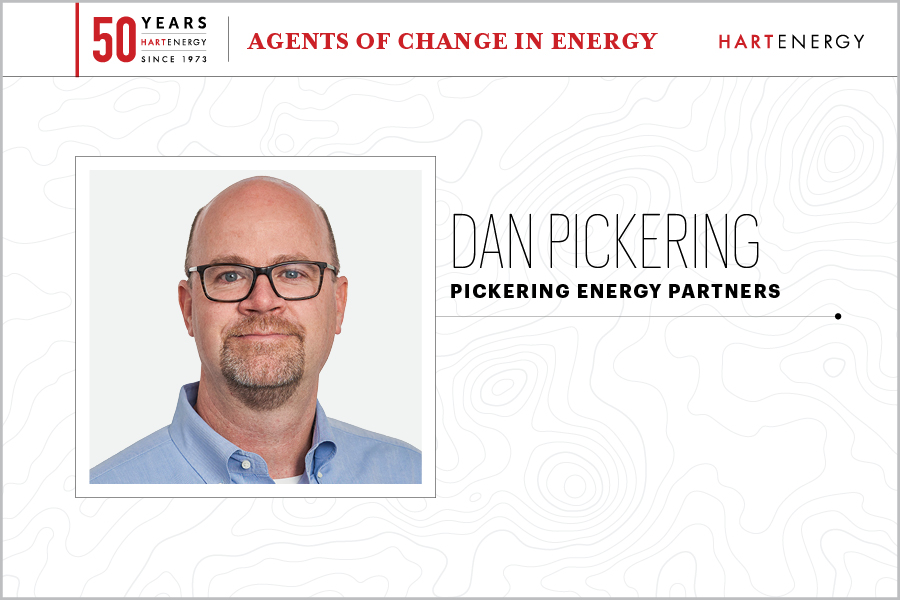Dan Pickering
Editor's note: This profile is part of Hart Energy's 50th anniversary Hall of Fame series honoring industry pioneers of the past 50 years and the Agents of Change (ACEs) who are leading the energy sector into the future.

Growing up in Missouri, where some 69,000 barrels of oil were produced last year, according to the state’s Department of Natural Resources, Dan Pickering’s entrance into the energy business was not a given.
He enjoyed science, however, and an engineering career beckoned.
“It seemed kind of exotic and exciting to an 18-year-old college freshman, and one thing led to the next, and then I was in the energy business for all my life,” he told Hart Energy.
During his first year at the Missouri University of Science and Technology in 1985, he crafted somewhere on the order of 50 letters on his typewriter and mailed them to oil and gas companies looking for an entrance. The effort paid off. The summer between his freshman and sophomore years, Pickering worked at Phillips Petroleum—now Philips 66—in a gig normally reserved for older students.
“That sort of got me the experience that led to the next job and then the next job,” he said. “And so, I would say a highlight was having the good fortune to get involved in the space early as a young college kid.”
After business school at the University of Chicago, Pickering went into money management at Fidelity Investments, where he was assigned to cover the energy sector on the heels of a long industry downturn in 1994.
“I got to see the sector go from down and out to being in really great shape,” he said. “I got to see the consolidation of the ’90s.”
Fast-forward to 1996 and Pickering joined Simmons & Company International as a research analyst covering the energy sector under the tutelage of founder Matt Simmons, which paved the way for Pickering to step out and start his own business—Tudor, Pickering, Holt & Co. (TPH), a move that, in his mid-30s, was “scary and exciting at the same time.”
“And I was lucky enough to have really great partners with Bobby Tudor and Maynard Holt. We bought the shale boom. Experiencing a boom like shale was amazing. To sort of build a business within an upcycle was so exciting,” he said.
TPH was acquired by Perella Weinberg Partners in 2016.
He founded Pickering Energy Partners in 2019, deploying billions of dollars in capital to target oil and gas, as well leading the industry with consulting and advisory insight.
“And then, starting again with Pickering Energy Partners … You can’t teach an old dog new tricks, so we just wrote the same playbook and have been out enjoying the current recovery in the energy patch,” he said.
Leading the Houston-based firm, Pickering has found the disruptive impact of the energy transition too important to ignore—and capital has a big role in the megatrend that now defines much of the market. Last year, the firm created an energy transition advisory practice focused exclusively on clean energy, decarbonization solutions and other critical energy transition matters.
“The smarter we get about energy transition topics, the better we’re going to be at our specific jobs within the verticals. I believe that the word ‘transition’ is going to get dropped over the next 10 years, and it’s just going to be ‘energy,’” Pickering told Hart Energy when the team’s advisory board was created in September 2022.
The lessons during Pickering’s career, as well as those of the last 50 years for the industry, are many, but some stand out.
“You’ve got to have respect for the cyclicality. We’re in a commodity business. There are boom-and-bust cycles. I think the application of that to the future, that’s going to apply to the energy transition too,” he said. “We’re going to see cycles in that business, too.”
The cyclicality applies to more than just supply and demand, and commodity prices. It also exists in the availability of capital.
“Sometimes folks want to throw money at you, and then they want to put you in bankruptcy,” he said. “I think that having a healthy respect for capital availability is going to be really important.”
And, he said, energy is a global business; its international component will remain key.
“This is about the rocks and geology and pipelines and lots of capital, but it’s really also a lot about people—whether that’s the partners you pick, either as individuals or core companies—having good partners, I don’t think that’s going to go out of style.”
—Deon Daugherty, Editor-in-Chief
